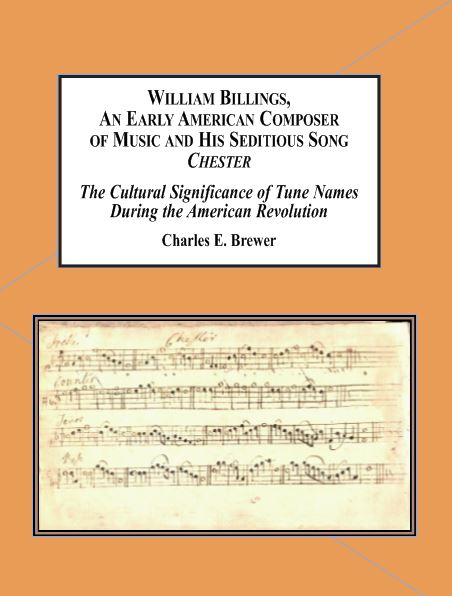This is our backup site. Click here to visit our main site at MellenPress.com
WILLIAM BILLINGS, AN EARLY AMERICAN COMPOSER OF MUSIC AND HIS SEDITIOUS SONG CHESTER The Cultural Significance of Tune Names During the American Revolution

| Author: | Brewer, Charles | |
| Year: | 2017 | |
| Pages: | 188 | |
| ISBN: | 1-4955-0579-0 978-1-4955-0579-9 | |
| Price: | $159.95 | |
William Billing's Chester is perhaps his best known composition, though the choice of name is atypical of his usual naming practice, since the name Chester occurs rarely in sources from Colonial New England, and the significance of his significance of his evocative text that has not been examined in detail.
Reviews
"Focusing on political history and context, Brewer's monograph establishes a new role for these tunebooks. Firmly anchored in their time and place of publication and authored by one who was passionately committed to the patriotic cause, they functioned as political statements and topical commentaries in addition to being musical anthologies."
Dr. Nym Cooke,
Eagle Hill School
"Professor Brewer is deft in handling both the music and the historical background and sources. The breadth and depth of his research in British and American history and genealogical documents is masterful and impressive. With this monograph Professor Brewer has built a convincing case in support of his thesis. He demonstrates the significance of the names of Billing's tunes and points out that arguably Billing's most well-known work, Chester, is particularly meaningful politically because it connects Britain's Civil War one-hundred years earlier with the American Revolution. Dr. Barbara Lambert, Oberlin College
"One result of this analysis is a portrait of William Billings as an American patriot, a portrait of revolutionary fervor. A second result, at least for this reader , is a presentation of evidence that Billings was a theologian of America's role in the divine plan." Professor Walter L. Moore, Florida State University
"Professor Brewer is deft in handling both the music and the historical background and sources. The breadth and depth of his research in British and American history and genealogical documents is masterful and impressive. With this monograph Professor Brewer has built a convincing case in support of his thesis. He demonstrates the significance of the names of Billing's tunes and points out that arguably Billing's most well-known work, Chester, is particularly meaningful politically because it connects Britain's Civil War one-hundred years earlier with the American Revolution. Dr. Barbara Lambert, Oberlin College
"One result of this analysis is a portrait of William Billings as an American patriot, a portrait of revolutionary fervor. A second result, at least for this reader , is a presentation of evidence that Billings was a theologian of America's role in the divine plan." Professor Walter L. Moore, Florida State University
Table of Contents
Foreword
Acknowledgments
Chapter 1: A World of Tune Names
Chapter 2: Billing's Tune Names
Chapter 3: Chester
Appendix I: Alexander Gillet, Union Tune Psalm 133, from Booge's Book
Bibliography
Index
Acknowledgments
Chapter 1: A World of Tune Names
Chapter 2: Billing's Tune Names
Chapter 3: Chester
Appendix I: Alexander Gillet, Union Tune Psalm 133, from Booge's Book
Bibliography
Index
